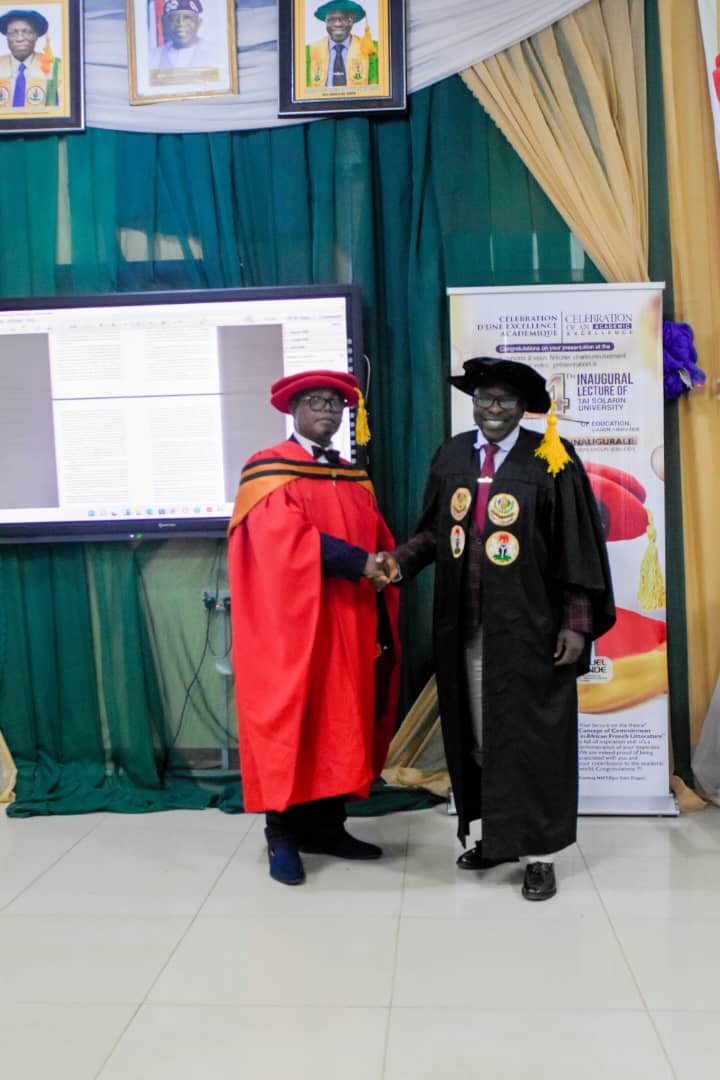African literature has been described as not just a medium for artistic expression but also as a powerful tool for advocacy, cultural preservation and the pursuit of social justice.
A University Don, Professor Samuel Olufemi Babatunde of the College of Humanities (COHUM), Tai Solarin University of Education made this assertion when he delivered the University’s 34th Inaugural Lecture titled: Concept Of Commitment In African French Literature: African Masses At The Mercy Of African Leaders, recently at the University’s main campus, Ijagun.
He further noted that Francophone and Anglophone African Authors engage deeply with the realities of their societies, offering critical reflections on identity, justice and the ongoing struggles their communities face.
“The African masses represent a dynamic and diverse segment of the population, deeply influenced by their historical legacies and contemporary challenges. Their collective experiences outline the social, political and cultural landscape of the continent.
“Understanding the complexities of the African masses is very essential for addressing their needs and aspirations, fostering social change and promoting sustainable development by the African leaders”, the Professor of African French Literature noted.
Speaking further, Professor Babatunde observed that, “what holds the attention of these writers is the disillusionment caused by the failure of the leaders of independent African countries to make life easy for the African masses, therefore, the political and social facts”.
He noted that after centuries of servitude and alienation of Africans by their colonial masters, African writers are deeply politicised and committed to the welfare, social and economic rights of the African masses.
Therefore, many writers from the black African continent have woken and participated in writing novels, poems and plays to criticise the insecurity and unfavourable colonial situations in their respective countries.
Among others we can mention Abdoulaye Sadji (Maimouna, la petite fille de Darka, 1953),Mongo Beti,under the pseudonym of Eza Boto,(Ville Cruelle, 1954), Benjamin Matip (Afrique, nous t’ignorons, 1956),Bernard Dadie(un Negre a Paris, 1956),Ferdinand Oyono(uneviede Boy, 1956, and Le vieux Negre et la medaille, 1956).To this non-exhaustive list is added another name, that of Sembene Ousmane, a Marxist.
Prof. Babatunde noted that apart from the expression of ideas, African literature also serves as a mirror to society, reflecting its values, struggles and transformation throughout history. It also aids emotional impact, entertainment, cognitive development, cultural preservation, connection and understanding.
On the teaching and learning of French as a foreign language in Nigeria, Babatunde asserted that inattentiveness of students during the teaching process, coupled with insufficient knowledge of French grammar, creates a big problem for their language performance.
He suggested that regular dictation exercises and reading skills will facilitate students’ mastery of French language accents.
He urged French teachers and all stakeholders in education to replan the French language curriculum with regard to an excellent implementation of multicultural concepts to enhance our national restructuring process in Nigeria.
The University Don further recommended the examination of pedagogy of the French language at the secondary school level with particular reference to how folklore can be taught to motivate pupils, noting the efficacy of folklore in impacting the elements of grammar, phonetics, Lexie’s, culture, morals and creativity which will consequently contribute to the total development of the learners.
“The use of video documents in teaching helps in the process of evolution of teachers and of the learners of French as a foreign language in Nigeria”, he added.
The event, which was well attended by friends, family members, Professional Colleagues and well-wishers, was also graced by the Deputy Vice Chancellor, Prof Adekunle Adeogun; the University Registrar, Mr Dapo Oke FCIA, MANUPA; the Bursar, Mr Kayode Ogunneye FCA; the University Librarian, Prof Adebambo Oduwole, among others.

